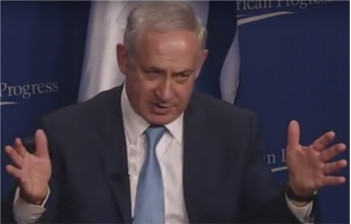 Support for boycotts, divestment, and sanctions (BDS) targeting Israel is growing, generating
great angst and solution-searching amongst Israel supporters – including pro-peace progressives – in the United
States and elsewhere in the world. From the Adelson-Saban summit earlier this year, which gave
birth to a new anti-BDS organization (to be
led by someone who for years headed a far right-wing, pro-Israel, Evangelical Christian operation), to
Democratic presidential candidate
Hillary Clinton’s letter to Jewish leaders, BDS is now being treated even by many pro-peace progressives as the
new “existential” threat to Israel, despite the fact that the actual track record of the BDS movement, in terms of
concrete impact, is thus far mixed.
Support for boycotts, divestment, and sanctions (BDS) targeting Israel is growing, generating
great angst and solution-searching amongst Israel supporters – including pro-peace progressives – in the United
States and elsewhere in the world. From the Adelson-Saban summit earlier this year, which gave
birth to a new anti-BDS organization (to be
led by someone who for years headed a far right-wing, pro-Israel, Evangelical Christian operation), to
Democratic presidential candidate
Hillary Clinton’s letter to Jewish leaders, BDS is now being treated even by many pro-peace progressives as the
new “existential” threat to Israel, despite the fact that the actual track record of the BDS movement, in terms of
concrete impact, is thus far mixed.
Former APN intern Hamze Awawde and Sarah Perle Benazera are a Palestinian and an Israeli who go to Rwanda to learn first hand about the extraordinary path the Rwandan youth has taken on the road to unity and reconciliation following the 1994 genocide. A Production by The Aileen Getty School of Citizen Journalism YaLa Young Leaders
By Yariv Oppenheimer is the secretary-general of Peace Now. This article appeared first on November 20, 2015 in Ynet.com T
he Paris attacks cannot justify for a minute our ongoing control of the Palestinians and do not make the vision of a bi-national state any better for Israel.
If the Islamic State members could, they wouldn't hesitate to hurt Palestinian President Mahmoud Abbas too and behead him. As far as the radical Islam created by ISIS is concerned, the Palestinians and their leadership are heretics too.
This week, Alpher discusses what strategic significance the Paris Massacre might be to the Islamic State; whether it is a sign that ISIS is losing in the Levant; what other countries can we expect ISIS to target now; whether the constellation emerging after the Paris attacks affect Israel’s security; why the former Yemeni prime minister Abdul Karim al-Eryani, who died at age 81 in his Cairo exile, was significant, and what this tells us about the future of Yemen.
 Barbara Green has been a volunteer for Americans for Peace Now for many years. She lives in
Washington, DC.
Barbara Green has been a volunteer for Americans for Peace Now for many years. She lives in
Washington, DC.
If we look to the Torah for lessons in how we are to live our lives today, we're hard-pressed to find it in Vayeitze. Rather this is a series of lessons in duplicity, trickery, bad faith between kinsmen, and ultimately the creation of a physical boundary between them which neither is ever again to cross. Laban tricks Jacob, Rachel tricks Laban, Jacob tricks Laban. In the end the 'heroes-heroines," our ancestors, narrowly escape with their lives and flocks intact.
The absurd notion that, during his current trip to the White House, Israeli Prime Minister Benjamin Netanyahu has now signed on to a two-state solution after only eight months ago saying that he would never allow a Palestinian state to emerge is material for George Orwell’s book, 1984.
The recent outbreak of violence in the streets of Israel and Palestine is a wake-up call to all those who seek peace between Israelis and Palestinians. The United States holds a key to bringing the violence to an end and putting the parties on the road to realizing, what the U.S. and virtually every other nation in the world has called for, the implementation of two states, Israel and Palestine. We call on President Obama to act now and recognize the state of Palestine, a process started by Republican President George W. Bush. This single act is urgently needed in order to provide the next U.S. president with a platform that places both Israel and Palestine on equal footing, at least in terms of formal U.S. recognition.
Washington, DC - Americans for Peace Now (APN) joins its Israeli sister-organization Shalom Achshav (Peace Now) in welcoming the European Union’s new guidelines for labeling products made in West Bank settlements.
A recent article in Foreign Affairs by Brookings fellow Natan Sachs is getting a lot of attention: Why Israel waits: Anti-Solutionism as a strategy. (Full disclosure: Sachs is a friend and someone for whom I have great professional respect.)
The piece offers some valuable insights into how Israeli Prime Minister Benjamin Netanyahu and those around him
justify their approach on national security issues. However, the analysis suffers from an important omission with
respect to the Israeli government's approach to the Palestinians, and offers a policy recommendation that, if
adopted, would be disastrous.


